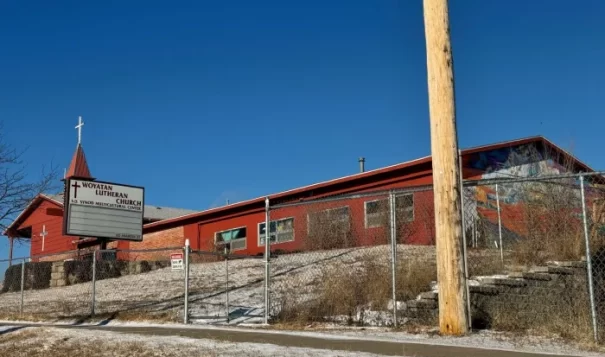News Based on facts, either observed and verified directly by the reporter, or reported and verified from knowledgeable sources.
New Indigenous-led shelter provides help to those in need
 The Woyatan Lutheran Church is an Indigenous-led church on Rapid City's northside. (Darsha Dodge, Rapid City Journal)
The Woyatan Lutheran Church is an Indigenous-led church on Rapid City's northside. (Darsha Dodge, Rapid City Journal)
Pejuta Waste O'Tipi aims to help the homeless community in Rapid City
Clay White Eagle drives a small burgundy bus around Rapid City with two American Indian Movement flags mounted on the back. The Cheyenne River Lakota man picks up people in need of warmth or a ride to the new Pejuta Waste O’Tipi center at the Woyatan Lutheran Church.
Pejuta Waste O’Tipi, or Good Medicine Lodge, is a new Indigenous-led initiative to help the homeless community following the closure of the Hope Center, a resource for the homeless community that provided shelter and meals, on Dec. 8, 2023.
The initiative acts as a day shelter, providing two meals a day to whomever may need them, and has on three occasions acted as an overnight shelter. Beyond being a day shelter, Pejuta Waste O’Tipi can provide individuals with basic needs support, advocacy, cultural healing programs, obtaining documentation, peer support and leadership training.
“It’s about getting them back out into society,” White Eagle said. “We’ve all worked out there in the field and we just wanted to do more. A lot of the time we’d get them into places to try and get more resources and they’d be turned away.”
After the Hope Center closed, the group knew they needed to do something. Woyatan Lutheran Church opened its doors to the community, acting at times as an emergency shelter. The program started off as a place for homeless people to receive mail. Without a mailing address, a person can’t get a driver’s license or a Social Security check cashed.
On Jan. 12, during a strong winter freeze, Pejuta Waste O’Tipi erected two military-grade warming tents at the Woyatan Lutheran Church and opened the inside of the building. Later that day, organizers were served with a cease-and-desist from the city citing safety concerns. Despite that setback, organizers pushed forward, rearranging to meet the city’s demands but continuing to operate.

Woyatan Lutheran Church covered the insurance cost and provided the church for the program. Support from the NDN Collective, several other area churches, the YMCA and the Great Plains Tribal Leaders Health Board have helped keep the new initiative going.
“It’s about being a safe space, offering them a space to be helped and to help them be a part of something bigger than themselves,” said Priscilla Roach-Wolfe, Cheyenne River Lakota and the program’s case manager. “So far, more than half of them have stayed sober by choice and are waiting to move onto the next step in whatever their goals are in life.”
Besides shelter, people in the program volunteer around Rapid City, cleaning around businesses, highways and other places. White Eagle drives anyone interested in volunteering to their next location. People also volunteer in the kitchen and around the Woyatan Lutheran Church wherever help is needed.
“We hope to give them that family setting that they probably haven’t had however long they’ve been out there,” White Eagle said. “Hopefully that sparks something inside and they want to keep changing.”
On March 21, Pejuta Waste O’Tipi stopped offering overnight shelter and reverted to being a day shelter. Lunch and dinner are still provided and breakfast if needed, but services end in the evening. Over 100 people are served per meal every day, meaning that on occasion over 300 meals are distributed.
Groups like the COUP Council, a non-profit local Indigenous organization, have provided meals on several occasions.
“We’ve found that there’s a real difference in the energy of our relatives when we’re the staff doing this,” said Annie Bachard, Anishinaabe descent. “I think our mission and the way we go about it has a lot to do with that. I think that this is about finding a new way to do things. That’s not to say that other people are doing things right or wrong, it’s just to say that what we’re doing up here is meeting people where they’re at.”
Anyone interested in contributing can visit pejutawaste.org and donate or volunteer to bring meals. Meal train donations are open throughout the rest of March.
